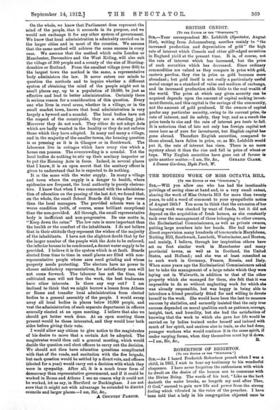BRITISH CREDIT.
[To THE EDITOR OF THZ "SPECTATOIL"1
SIR,—Your correspondent Mr. Lehfeldt (Spectator, August 31st), writing from Johannesburg, ascribes mainly to "the increased production and depreciation of gold" the high rate of interest which Consols and other gilt-edged securities in England yield at the present time. It is, of course, not the rate of interest which has increased, but the price of such securities which has decreased. Since ordinary commodities are valued as they compare in price with gold, ca,eteris paribus, they rise in price as gold becomes more abundant ; but gold itself is not really a particularly useful metal except as a standard of value and medium of exchange, and its increased production adds little to the real wealth of the world. The price at which any given security can be acquired depends upon the amount of capital seeking invest- ment therein, and this capital is the savings of the community, not the amount of gold produced. If the owners of capital prefer any particular security, owing to its current price, its rate of interest, and its safety, they buy, and as a result the price tends to rise and the rate of interest pro tanto to fall. It is notorious that of late not only has foreign capital not come here as of yore for investment, but English capital has gone abroad. Therefore English securities, compared to those abroad, have fallen in price, or, as Mr. Lehfeldt would put it, the rate of interest has risen. There is no more mystery about it than the rise and fall in price of wheat or hops. Why English securities have gone out of favour is quite another matter.—I am, Sir, &c., GERARD CLARK. 4 Sussex Gardens, Hyde Park, W.






































 Previous page
Previous page